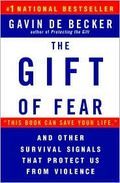 "Anxiety, my old friend," my friend Colleen Wainwright once wryly confessed. We women generally worry more than men. For example, "While men are bearing the brunt of the job losses, women report much higher levels of fear and worry about their families' financial security than men do," and women worry more than their husbands about prostate cancer coming back.
"Anxiety, my old friend," my friend Colleen Wainwright once wryly confessed. We women generally worry more than men. For example, "While men are bearing the brunt of the job losses, women report much higher levels of fear and worry about their families' financial security than men do," and women worry more than their husbands about prostate cancer coming back.
Yet it is vital for us all to recognize the difference between worry and fear.
 "Our fears are fashioned out of the ways in which we perceive the world," wrote Gavin Becker, author of The Gift of Fear: Survival Signals That Protect Us From Violence.
"Our fears are fashioned out of the ways in which we perceive the world," wrote Gavin Becker, author of The Gift of Fear: Survival Signals That Protect Us From Violence.
Worry Is The Fear We Manufacture
Worry, anxiety, concern and wariness all have a purpose, but they are not fear. Any time your dreaded outcome cannot be reasonably linked to pain or death and it isn't a signal in the presence of danger, then it really should not be confused with fear.
See Worry As A Form Of Self-harassment
Worry doesn't generate solutions but distracts from finding them. To free yourself from worry sooner, understand what it really is. Most people worry because it provides some secondary reward such as:
• Worry is a way to avoid change; when we worry, we don't do anything about the matter.
• Worry allows us to avoid admitting powerlessness over something, since worry feels like we're doing something. Prayer also makes us feel like we're doing something, and even the most committed agnostic will admit that prayer is more productive than worry.
• Worry is a cloying way to have a connection with others. Worry somehow shows love. The other side of this is the belief that not worrying about someone means you don't care about that person. As many people who've been worried about know well, worry is a poor substitute for love or for taking loving action.
• Worry is a protection against future disappointment. After you complete an important project where the success of your approach won't be known for some while, for example, you can worry about it. Ostensibly, if you can feel the experience of failure now, rehearse it, so to speak, by worrying about it, then failing won't feel as bad when it happens.
• Worrying is a "magical amulet," according to Emotional Intelligence author Daniel Goleman. Some people feel it wards off danger. They truly believe that worrying about something will stop it from happening.
When worrying, ask yourself, "How does this serve me?" To be free of fear and yet still get its gift, consider these techniques:
1. When you feel fear, listen.
2. When you don't feel fear, don't manufacture it.
3. If you find yourself creating worry, explore and discover why.
We Choke on Anxiety
Anxiety, unlike real fear and like worry, is always caused by uncertainty. It is caused by predictions in which you have little confidence. If you predict you will be fired and you are certain that your prediction is correct, you don't have anxiety about being fired, but about the ramifications of losing a job. Predictions in which you have a high confidence free you to respond, adjust, feel sadness, accept, prepare, or to do whatever you need to do. You can reduce your anxiety by improving your predictions, thus increasing your certainty. It is worth doing, because the word anxiety, like worry, stems from the root word meaning "to choke," and that is just what it does to us.
Our imaginations can be fertile soil in which worry and anxiety grow from seeds to weeds, but when we assume the imagined outcome is a sure thing, we are in conflict with what Proust called an inexorable law: "Only that which is absent can be imagined." In other words, what you imagine -- just like what you fear -- is not happening. Discover more ways to stop worrying from Amanda L. Chan's helpful article and from undercover and counterintelligence FBI agent LaRae Quy in her book The Secrets of a Strong Mind.